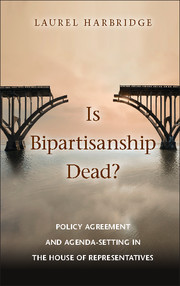Book contents
- Frontmatter
- Contents
- List of figures and tables
- Acknowledgments
- 1 Introduction
- 2 A Puzzle of Declining Bipartisanship
- 3 Strategic Partisan Agenda-Setting
- 4 Agenda-Setting and the Decline of Bipartisan Cooperation
- 5 Variation in Strategic Partisan Agenda-Setting
- 6 Strategic Partisan Agenda-Setting Across Policy Areas
- 7 District Responsiveness and Member-Party Relationships
- 8 The Past, Present, and Future of Bipartisanship
- Appendix
- References
- Index
4 - Agenda-Setting and the Decline of Bipartisan Cooperation
Published online by Cambridge University Press: 05 March 2015
- Frontmatter
- Contents
- List of figures and tables
- Acknowledgments
- 1 Introduction
- 2 A Puzzle of Declining Bipartisanship
- 3 Strategic Partisan Agenda-Setting
- 4 Agenda-Setting and the Decline of Bipartisan Cooperation
- 5 Variation in Strategic Partisan Agenda-Setting
- 6 Strategic Partisan Agenda-Setting Across Policy Areas
- 7 District Responsiveness and Member-Party Relationships
- 8 The Past, Present, and Future of Bipartisanship
- Appendix
- References
- Index
Summary
In 1974, just over 70 percent of all roll call votes had bipartisan voting coalitions. By 1995, only 27 percent of roll call votes were bipartisan. By this metric, bipartisan cooperation fell by more than three-fifths over a 20-year period. Over the same time period, however, bipartisan agreement in cosponsorship coalitions declined by less than one-fifth. The comparison of these two years highlights the broader pattern, and the empirical puzzle, at the heart of this book – bipartisan agreement in roll call voting has declined substantially, but bipartisan agreement in cosponsorship coalitions has declined much less. Agenda-setting provides one avenue to reconcile this puzzle.
This chapter focuses on the first guiding insight of my theoretical framework, which argues that the content of the agenda affects voting patterns. The primary goal of the chapter is to describe the extent to which party leaders pursue bipartisan legislation on the House agenda over time. These patterns of agenda-setting, at least for the roll call agenda, must track with observed patterns of roll call voting in Chapter 2. The secondary goal of this chapter is to consider the connection between increasing partisanship in the roll call agenda and the overall degree of bipartisanship in the legislative process and in policy outputs. I examine patterns of bipartisanship in public laws, differences between roll call and voice votes, and opportunities to craft legislative compromises. All of these patterns speak to how often party leaders pursue bipartisanship in the House and the policy consequences for doing so.
- Type
- Chapter
- Information
- Is Bipartisanship Dead?Policy Agreement and Agenda-Setting in the House of Representatives, pp. 62 - 83Publisher: Cambridge University PressPrint publication year: 2015



